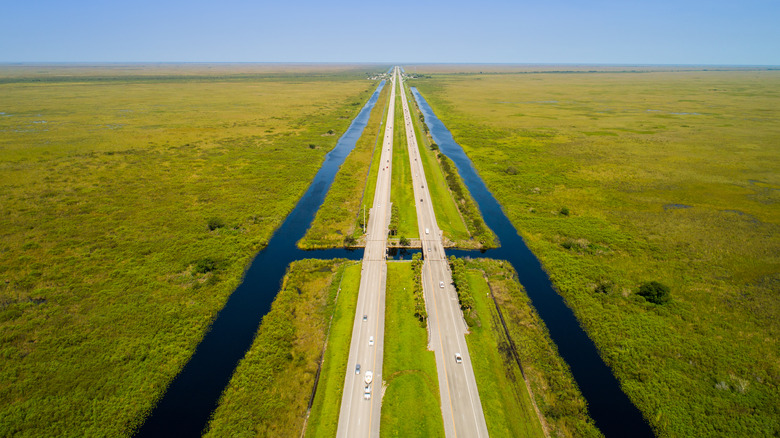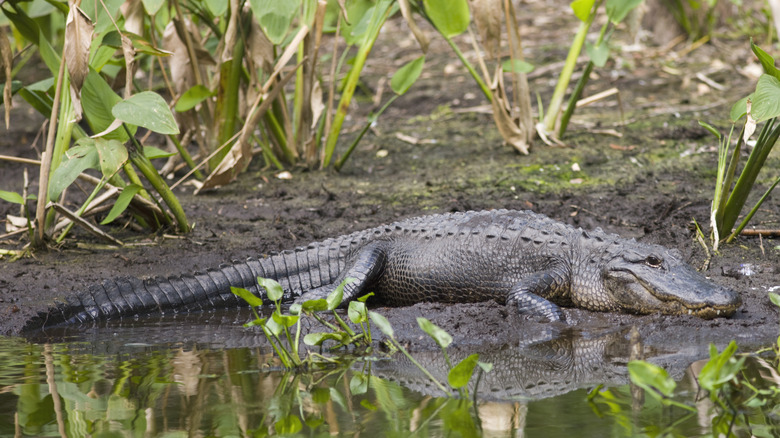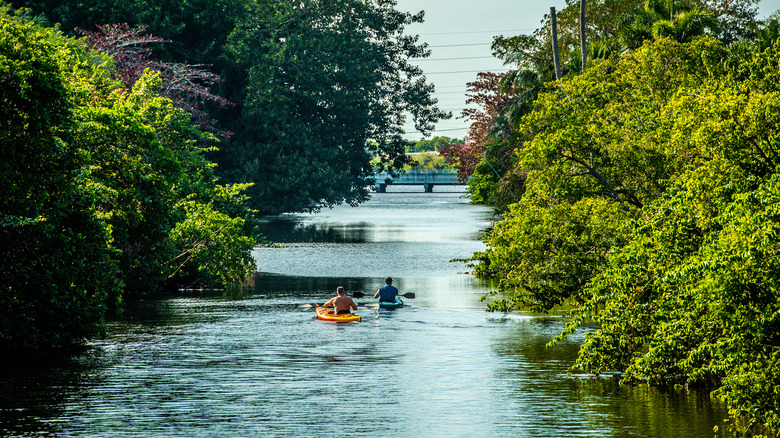This Florida Highway With A Menacing Name Is A Thrilling Road Trip For Wildlife Lovers
Florida's unique terrain and the multitudes of wildlife that call the land home make Florida stand out among the rest of the 50 states in the U.S. While plenty of animals come to mind when thinking of Florida, the alligator is likely near the top. Even Gatorade traces its origins to the University of Florida, whose mascot is the alligator. While Everglades National Park southwest of Miami is a popular spot for Florida's wildlife, there is a road trip that takes you into alligator habitat further north of the park.
Go from popular towns with iconic beaches to swamp lands and back on Alligator Alley, an 80-mile section of I-75 that connects Naples to Ft. Lauderdale and Miami. Alligator Alley gets travelers close to Fakahatchee Strand Preserve State Park, Big Cypress National Preserve, and several wildlife management areas. Be sure to bring $3.75 cash for the toll and fill your car with gas before you venture out of the cities that bookend Alligator Alley as there are no gas stations along this remote road.
Spot alligators at state parks and nature preserves
Naples, Florida calls itself the "American Riviera" and with its colorful buildings and consistently sunny weather, it is easy to see why. The Naples Pier is a popular coastal hangout, but if you are looking for a hidden gem, go further north to Clam Pass Park and its neighboring beaches. Here you'll find mangroves teeming with wildlife and some of Florida's best white sand beaches.
On the south side of I-75 is Fakahatchee Strand Preserve State Park just a few miles from State Road 29, which intersects with I-75. To try to catch a glimpse of some alligators, walk along the half-mile Big Cypress Bend Boardwalk. For hiking and biking, use the trailheads along James Memorial Scenic Drive still on State Road 29. West Main Tram trail is two miles long while East Main Tram trail is 10 miles long.
Keep heading east to find the Big Cypress National Preserve and Big Cypress Wildlife Management Area within it. Use State Road 29 and then US-41 to get here. The 27-mile Loop Road is a popular scenic drive in Big Cypress, but if you want to stay a while, check out the preserve's backcountry camping options. However, be sure to leave no trace of your stay to protect the land and its wildlife.
Take a kayak tour in Fort Lauderdale
Before you reenter city life on the other side of Florida, you'll find the Everglades and Francis S. Taylor Wildlife Management Area. Wildlife is here year-round, but in February, you can spot plenty of birds like wood storks not far from I-75. Fishing opportunities are abundant here as well, but you must have a license.
Fort Lauderdale comes into view as Alligator Alley nears its end. Delve into this city's unique history at the Bonnet House Museum and Gardens, a luxurious 1920s home gorgeously intact. Explore five different ecosystems in the property's gardens too. You can rent jet skis, try paddle boarding, or book a sunset kayak tour on Friday nights to see the nature of the region. Tours begin at the BG Whiskey Creek Hideout just over 10 miles from Bonnet House.
Some Alligator Alley travelers might want to head south from Fort Lauderdale to the famous Miami Beach. Aside from the vibrant beach scene, nearby you'll find the Miami Beach Botanical Garden and The Bass. This contemporary art museum housed in a 1930s art-deco building prides itself on showcasing anything from fashion to architecture and reflecting the area's diversity. It doesn't take long to see why Miami Beach is a top honeymoon destination in the United States.


